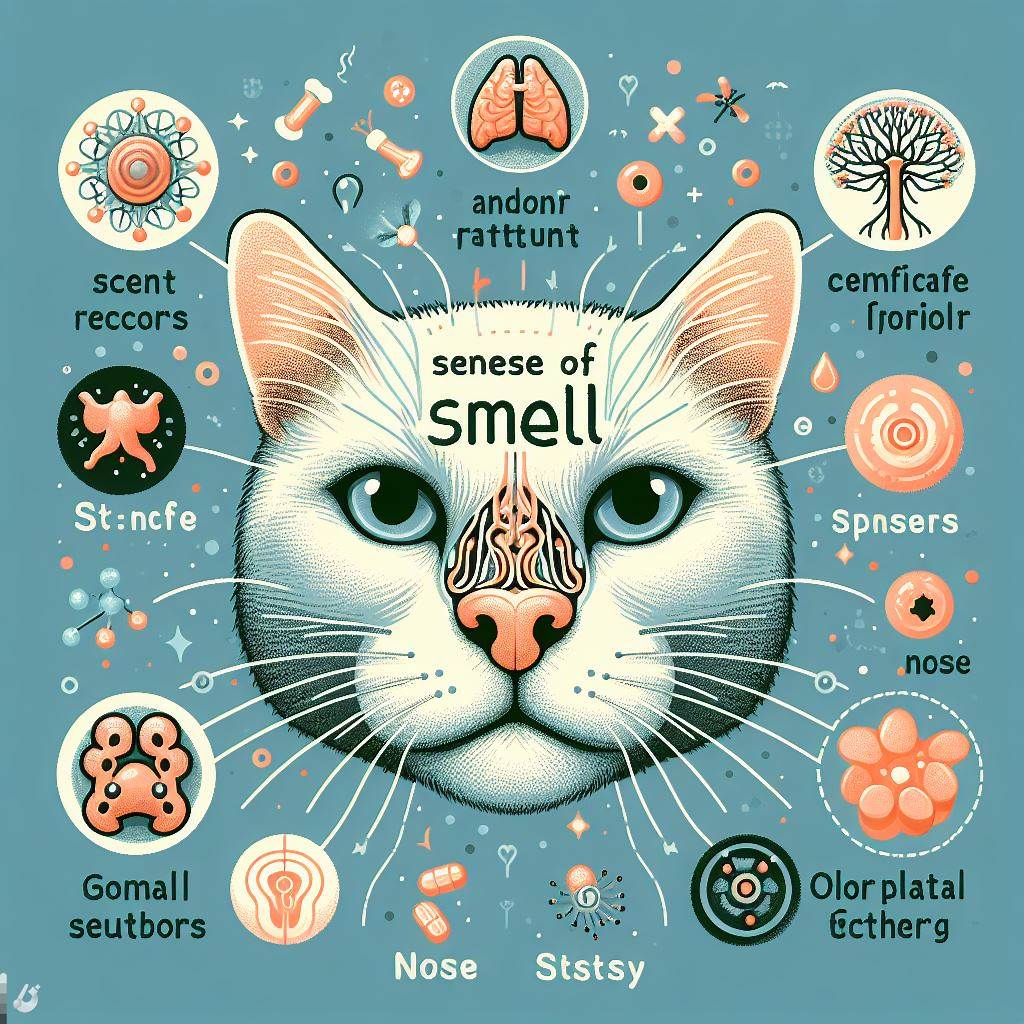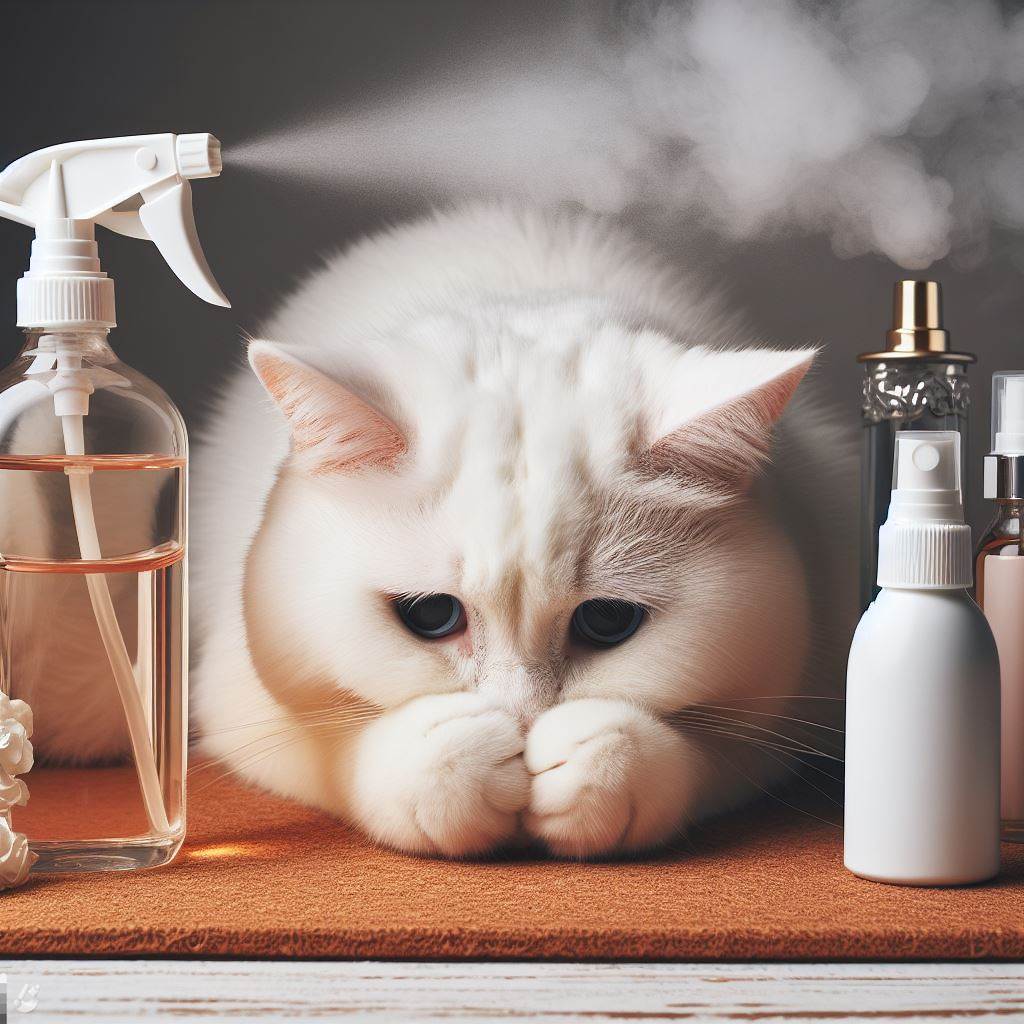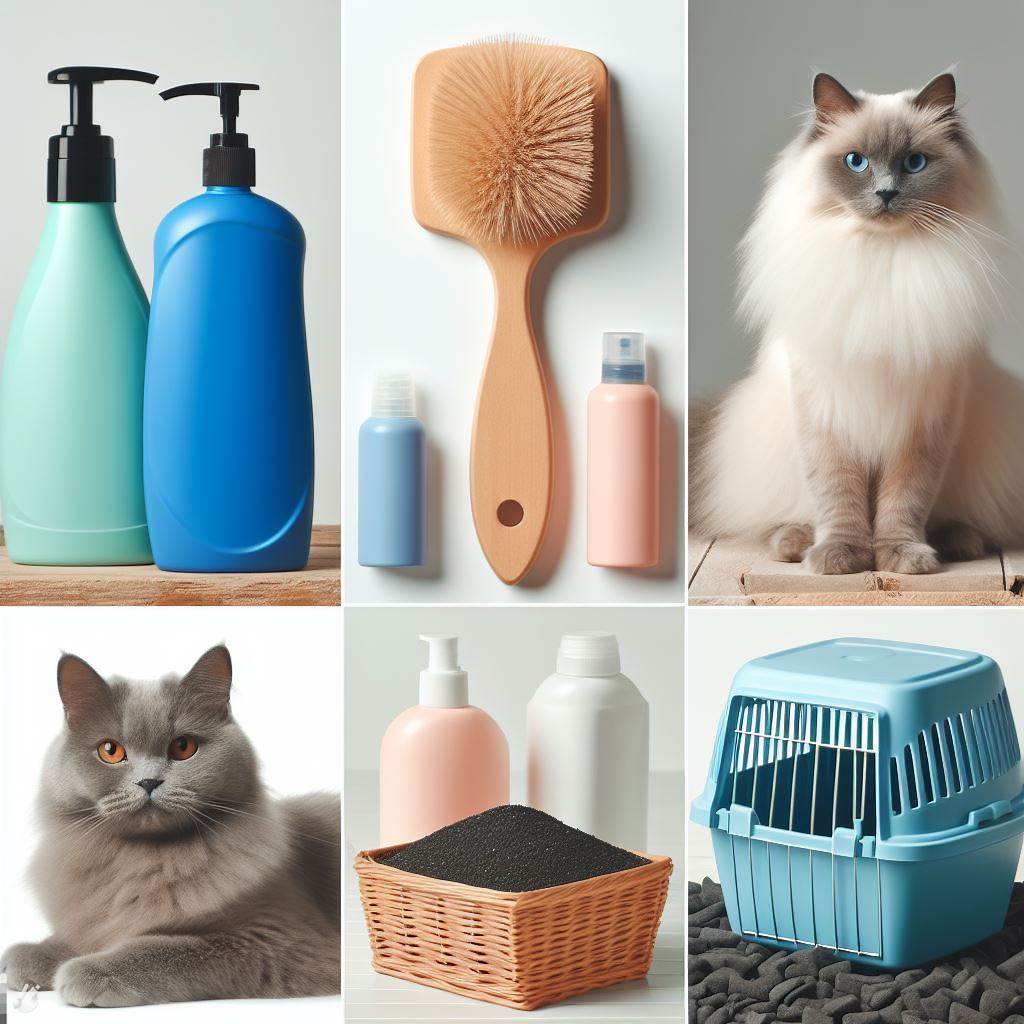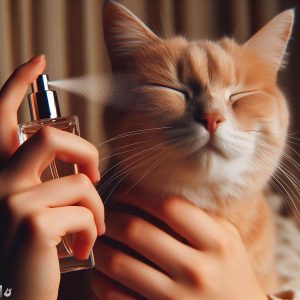As cat owners, it’s natural we want our kitties to smell fresh and clean. But while a spritz of perfume might leave your cat with a pleasant scent, doing so poses significant health risks.
In this article, we’ll cover:
- How cats’ senses differ from humans’
- Dangers of perfumes and fragrances for cats
- Safer alternatives for controlling pet odors
- My personal experience with scent sensitivity
- 12 tips for keeping your cat happy and healthy
Spraying artificial fragrances on or around your cat can lead to skin damage, respiratory issues, and toxic buildup over time. By understanding feline senses and using gentler approaches, you can avoid these hazards while still neutralizing odors.
A Cat’s Nose: Why Perfumes Bother Them So Much

We all know cats have excellent hearing and night vision. But did you know their sense of smell outperforms humans’ by almost 10 times?
A key reason fragrances bother cats more lies in their impressive olfactory abilities.
Cats possess nearly 200 million scent receptors compared to our humble 5 million. They use smell to hunt prey, sense danger, identify other animals, and more. Their powerful sniffers are central to their survival.
As obligate carnivores, cats evolved focusing heavily on smell and taste to locate nutrition sources. They lack receptors for sweet flavors but have an amazing ability to detect proteins and fats.
So while strong perfumes may seem pleasant or neutral to our weaker human noses, the same intense scents overwhelm cats’ hypersensitive sniffers. They can’t escape the nostril-assaulting smells we liberally apply.
Let’s explore why this causes significant issues…
Dangers of Spraying Perfumes and Colognes on Cats
Perfumes seem harmless enough. So why shouldn’t you spritz your kitty to leave her smelling pretty?
Consider that most fragrances today contain:
- Alcohol as the base
- Essential oils and extracts
- Synthetic fragrance chemicals
Each poses risks for cats when applied directly or inhaled regularly.
Alcohol Dries and Damages Delicate Feline Skin
Ever notice how drying hand sanitizers feel on your hands? Many leave skin flaky and irritated.
Now imagine that effect concentrated as alcohol-heavy perfume applied right on your much more delicate feline body covering. Ouch!
Most colognes, body sprays, and even “all-natural” perfume oils use high-percentage alcohol solutions as the carrier base. Contact with these can dry cats’ skin, causing flaking, redness, and damage. It strips protective skin oils crucial for cats’ coat health.
And if your cat licks residual perfume off their fur, alcohol ingestion can cause oral irritation and stomach upset. Both external skin and internal stomach membranes are vulnerable to harsh alcohol-based sprays.
Essential Oils and Extracts May Lead to Allergic Reactions
Many modern perfumes incorporate essential oils like lavender, lemon, rose, and tea tree for pleasant scents with purported wellness benefits.
However, just as some people develop skin reactions to these natural oils, cats can also experience allergic responses. Redness, bumps, itching, and hair loss may result where oils make direct skin contact.
Cats can additionally develop respiratory inflammation if they inhale large amounts of aromatherapy oils vaporized in home diffusers. So despite their “all-natural” branding, spraying these directly risks irritations.
Synthetic Fragrances Accumulate Toxically Over Time
Here’s where the real trouble starts. Mass-market perfumes today utilize synthetically produced compounds to mimic pleasant scents affordably.
However, these chemical concoctions often contain phthalates, acetates, phenols, and other ingredients linked to organ damage, hormone disruption, and cancer.
Repetitive exposure allows fragrances’ chemical components to enter cats’ bloodstream either through the skin or by inhaling trace amounts. From there, toxins dispatch to organs.
One example is galaxolide, a synthetic musk that bioaccumulates in blood, fat tissue, and breast milk in studies. Even small exposures over years enable buildup.
This toxic accumulation and organ strain happens gradually. But it can shorten cats’ lifespans and introduce disease. Are a few spritzes today worth that risk?
The Impact of Spraying Perfumes Around Cats

Given the sensitivities described above, what about lightly spritzing perfumes around your home while your cat is present?
This may seem an acceptable compromise for enjoying scented ambiance without directly touching kitty’s coat. But take care here as well.
You see, everything cats inhale or ingest passes by their nose first. So those wispy perfume molecules permeating your rooms still enter their system directly through nostril tissue.
Repeatedly breathing trace amounts of alcohol, botanical oils, and synthetic chemicals has cascading effects:
- Sinus irritation: Cats develop stuffy noses, sneezing, and head-shaking.
- Lung inflammation: Perfume components inflame delicate respiratory tissues over time.
- Liver and kidney strain: Breaking down foreign compounds taxes detox organs.
- Atopic dermatitis: Inhaled allergens manifest through skin problems like itching and bald patches.
So while the nose represents the initial site of insult for airborne home fragrances, cumulative damage spreads through the body from there.
In one study, 79% of cats with asthma lived in households that used air fresheners frequently. Other animals likely endure similar respiratory challenges.
Bottom line: Any way you slice it, cats don’t tolerate spritzed perfumes well—either applied directly or as lingering home aromas. It inevitably overwhelms their senses and harms their health.
My Cat Mittens’ Perfume Sensitivity Story
My first cat Mittens, adopted as a kitten, started developing asthma a few years after we got her.
The attacks scared me badly. She’d cough up foamy phlegm and wheeze for air. I rushed her to emergency vet visits several times when attacks seemed extreme.
We tried every treatment: steroids, bronchodilators, diet changes, you name it. The asthma persisted.
Finally, a holistic vet asked about household air quality. Were scented products used often?
That moment it clicked…My teen daughter and I both loved liberally spritzing body mists and perfumes daily without thinking. Poor Mittens couldn’t escape it!
Once we swapped fragrances for unscented grooming products only, Mittens’ asthma attacks decreased drastically within months. Creating that clean home air environment hugely improved her health long-term.
I felt terrible subjecting her to those toxins ignorantly. But it taught me just how significantly cats’ wellbeing depends on avoiding irritating fragrances inside and on their bodies. It’s just not worth the risks!
Healthier Approaches to Handle Cat Odors

Controlling pet-related smells motivates many owners to use perfumed sprays on themselves and their homes. But safer options exist!
Here are 6 smart tips for reducing odors without endangering your cat:
Regular Grooming
Brush kitties frequently to distribute skin oils evenly and remove loose dander/fur. Regular combing does wonders controlling odor at the source!
Odor-Blocking Litters
Many companies now offer litters containing activated charcoal, baking soda, and plant enzymes to absorb smells.
Clean the Litter Box Often
Scoop waste out utterly each day. Dump everything, wash, and refill litter every 1-2 weeks to control bathroom smells.
Wash Pet Beds/ Furniture Covers
Use unscented laundry detergent to pre-treat and wash cat beds, cushions, throw blankets, etc. Weekly washing removes odors trapped in fabric fibers.
Clean Floors/Carpeting
For homes with multiple cats, consider investing in an unscented vacuum and carpet cleaner to suck up fur, dander, and other odor sources.
Feed Odor-Reducing Foods/Treats
Some pet foods add yucca schidigera and other bindings to make waste less aromatic. Discuss options with your veterinarian.
The key is tackling the origin of odors through gentle cleaning rather than masking issues with toxic sprays. Your cat will thank you!
12 Reasons to Never Spray Perfume on Your Cat
To recap, here are 12 core reasons you should never intentionally apply fragrances and body sprays directly onto your cat or use them excessively inside your home:
- Cats’ sense of smell is about 10 times more sensitive than humans due to extra scent receptors. Strong artificial fragrances that seem nice to us absolutely bombard their nasal cavities.
- Alcohol-based perfumes dry out and damage cats’ skin since coats don’t contain protective sebum oil like human skin. Flaking, irritation, and chemical burns can occur.
- Essential oils now added for pleasant scents in many perfumes may trigger allergic reactions when applied directly onto cats.
- Synthetic fragrance chemicals accumulate slowly over time to damage cats’ organs and interfere with normal bodily functions.
- Lingering fragrance compounds in home air also get inhaled and absorbed into cats’ bloodstream, creating internal chemical buildup.
- Studies link air freshener use to 79% of cats with asthma. Respiratory inflammation occurs from breathing these toxins.
- Scented cleaning supplies, candles, and grooming products further contaminate indoor air to spur asthma attacks and sinus issues.
- Fragrances in carpet powders, litter deodorizers, and similar products get onto cats’ paws and fur during use, causing skin reactions.
- Even pleasant-smelling products labeled “all-natural” may contain botanical oils problematic for some cats. Essential oils can cause skin, nose, and lung irritation.
- Masking odors with fragrances doesn’t solve problems long-term. The sources of smells (fur, waste, etc.) requires gentle cleaning instead.
- Cat parents should tackle the origin of scents through brushing, washing items, cleaning litter boxes, and other methods that don’t endanger cats.
- Creating a fragrance-free environment optimizes cats’ health span and happiness while keeping your home smelling fresh. Use simple unscented products only around your pets.
The choice lies with you as a caring owner – prioritize your cat’s wellbeing, or go on masking issues in ways that ultimately sicken them. I know it’s habit for us, but please think twice before spritzing perfumes improperly around the cats you love.
Final Thoughts on Skipping Fragrances for Your Cat’s Sake
I hope this article gave you pause about ever spraying perfume directly onto your cat or freshening your home ambiance with toxic cleaners and fragrances.
It requires rethinking home care routines. But so much harm comes from ignoring how intensely cats experience scents. We just can’t appreciate it with our comparatively dull human noses!
But you can appreciate the health implications. So opt for simple, fragrance-free maintenance instead together with your cat.
Here’s to many happy, healthy years enjoying that bond without risky chemical exposures along the way!




